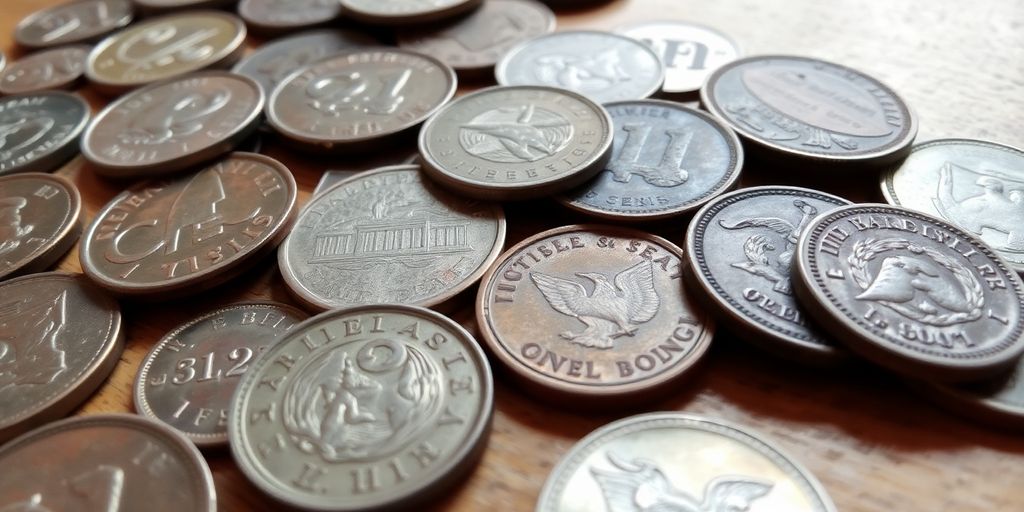If you’re thinking about selling old coins, it’s important to know where to start and what to look for. This article will guide you through understanding the value of your coins, finding local dealers, and making sure you get a fair deal. Whether you’re a seasoned collector or just starting out, these tips will help you navigate the process of selling your coins with confidence.
- Discovering the Best Goan Thali Near Me: A Culinary Journey Through Flavorful Delights
- Discover the Best Ramen Bowl Near Me: A Culinary Adventure Awaits!
- Discovering the Best Breakfast Places Near Me in San Jose: A 2024 Guide
- Discover the Best Places for Women Shopping Near Me: A Guide to Chic Finds and Local Gems
- The Ultimate Guide: Where to Buy Sod Near Me for a Lush Lawn
Key Takeaways
- Understand what makes your coins valuable before selling.
- Use online tools to find reputable coin dealers near you.
- Ask potential buyers about their experience and specialties.
- Avoid selling to pawn shops for better offers.
- Prepare your coins properly to attract serious buyers.
Understanding the Value of Your Old Coins
Factors That Affect Coin Value
When determining the value of your old coins, several key factors come into play:
- Condition: The state of the coin is crucial. Coins are graded on a scale from 1 to 70, where higher numbers indicate better condition.
- Rarity: How many of that coin exist today? Fewer coins mean higher value.
- Demand: If collectors want a specific coin, its value can increase significantly.
How to Document Your Coin Collection
Keeping track of your coins is essential. Here’s how to do it:
- Create a Spreadsheet: Use Excel or a similar program to list your coins.
- Record Details: Include the type of coin, quantity, and mint mark.
- Update Regularly: Keep your list current as you buy or sell coins.
Common Misconceptions About Coin Value
Many people have misunderstandings about what their coins are worth. Here are a few:
- Price Guides Are Absolute: Guides like the PCGS coin price guide provide estimates, not guarantees.
- All Coins Are Valuable: Not every old coin is worth a lot; condition and rarity matter.
- Melt Value Equals Numismatic Value: A coin’s melt value is based on its metal content, while numismatic value considers collector interest.
Understanding these factors can help you make informed decisions when selling your coins. Remember, a coin’s worth is ultimately what someone is willing to pay for it.
Finding Local Coin Dealers and Shops
When you’re ready to sell your old coins, finding a trusted coin dealer is essential. Here are some effective ways to locate local coin dealers and shops:
Using Online Directories to Locate Dealers
- Search by Location: Use online directories to find dealers in your area. You can search by city, state, or even zip code.
- Filter by Specialty: Many directories allow you to filter dealers based on their specialties, such as rare coins or bullion.
- Check Credentials: Look for dealers who are members of professional organizations, which can indicate reliability.
Visiting Coin Shows and Events
- Meet Dealers in Person: Coin shows are great places to meet multiple dealers at once.
- Network with Collectors: You can also connect with other collectors who might recommend reputable dealers.
- Learn About Coins: These events often have educational sessions that can help you understand coin values better.
Checking Reviews and Ratings of Coin Dealers
- Read Online Reviews: Websites like Yelp or Google Reviews can provide insights into a dealer’s reputation.
- Ask for Recommendations: Friends or family who collect coins may have suggestions.
- Look for BBB Ratings: The Better Business Bureau can help you find dealers with good customer service records.
Finding the right dealer can make a big difference in your selling experience. Take your time to research and choose wisely!
Questions to Ask a Potential Coin Buyer
Experience and Credentials
When considering a coin buyer, it’s essential to ask about their experience. Here are some questions to consider:
- How long have you been in the coin business?
- Are you a member of any professional organizations?
- Do you have a physical store or only attend coin shows?
Specialties and Interests
Understanding a buyer’s specialties can help you gauge if they are the right fit for your coins. Ask:
- What types of coins do you specialize in?
- Do you have a particular interest in rare coins or specific eras?
- Can you provide references from previous sellers?
Appraisal and Offer Process
Knowing how a buyer appraises coins is crucial. Consider these points:
- What is your process for evaluating coins?
- How do you determine the offer price?
- Are there any fees for appraisals?
Remember, most buyers will want to see your coins in person before making an offer. This is because they need to assess the condition accurately.
By asking these questions, you can better understand the buyer’s qualifications and ensure you get a fair deal when selling your coins. We’ve compiled a comprehensive guide to all things coin selling, so you can learn how to make the highest profit on your coins.
Avoiding Common Pitfalls When Selling Coins
Read More : Who Buys Antiques Near Me? Discover Local Buyers and Tips for Selling Your Treasures
When it comes to selling your old coins, there are several common mistakes that can cost you money. Here are some key points to keep in mind:
Why Avoid Pawn Shops and Gold Buyers
- Limited Offers: Pawn shops often buy coins based on their melt value, which is usually much lower than their actual worth.
- Lack of Expertise: These buyers may not have the knowledge to assess the true value of numismatic coins.
- Profit Margins: They keep the numismatic value for themselves, meaning you lose out on potential profits.
Recognizing Fair Market Value
- Research: Always do your homework on the value of your coins before selling.
- Use Multiple Sources: Check various price guides and auction results to get a better idea of what your coins are worth.
- Avoid Emotional Pricing: Don’t let personal attachment cloud your judgment on the value of your coins.
Protecting Yourself from Scams
- Verify Credentials: Always check the reputation of the buyer or dealer before making a deal.
- Get Everything in Writing: Ensure that any offers or agreements are documented.
- Trust Your Instincts: If something feels off, it’s okay to walk away from the deal.
Remember, selling coins can be a rewarding experience if you approach it with the right knowledge and caution. Avoiding these pitfalls can help you maximize your profits and ensure a smooth transaction.
Preparing Your Coins for Sale
Cleaning and Handling Coins
When getting ready to sell your coins, proper handling is key. Here are some tips:
- Always hold coins by the edges to avoid fingerprints.
- Use soft cloths to gently clean them if necessary, but avoid harsh chemicals.
- Store coins in a cool, dry place to prevent damage.
Packaging and Transporting Coins
To ensure your coins arrive safely, follow these steps:
- Use coin holders or flips to protect each coin.
- Place coins in a padded envelope or box for transport.
- Label the package clearly and consider using tracking.
Providing Accurate Descriptions and Photos
When selling, it’s important to give potential buyers clear information. Include:
- High-quality photos showing both sides of each coin.
- Details about the coin’s condition, year, and mint mark.
- Any special features, like if they are precious metal coins.
Remember, the more information you provide, the better your chances of getting a fair offer!
Exploring Different Types of Coin Buyers
Private Collectors
Private collectors are individuals who buy coins for personal enjoyment or investment. They often have specific interests, such as rare coins or certain historical periods. Many collectors are willing to pay a premium for coins that fit their collection. Here are some key points about private collectors:
- They may offer higher prices than dealers.
- They often have a deep knowledge of the coins they collect.
- Building a relationship with them can lead to better offers in the future.
Professional Coin Dealers
Professional coin dealers operate businesses that buy and sell coins. They usually have a wide range of coins available and can provide appraisals. Here are some characteristics of professional dealers:
- They often have a storefront or online presence.
- They may specialize in certain types of coins, such as gold or silver.
- They can provide insights into market trends and values.
Coin Shops and Retailers
Coin shops are physical locations where you can buy and sell coins. They often have a variety of coins and collectibles. Here’s what to know about coin shops:
- They provide a convenient way to sell coins locally.
- Many shops offer appraisals and can help you understand your coins’ value.
- The Coin Shoppe is a great example, offering a 100% guarantee on buying and selling modern numismatics.
Understanding the different types of buyers can help you make informed decisions when selling your coins. Each type has its own advantages and can lead to different selling experiences.
Utilizing Coin Grading and Certification Services
Benefits of Coin Grading
Grading your coins can significantly impact their value. Understanding the grading scale helps you know what your coins are worth. Here are some benefits of getting your coins graded:
- Increased Value: Graded coins often sell for more.
- Market Trust: Buyers trust certified coins more.
- Better Selling Options: Graded coins can be sold at auctions or through dealers more easily.
Top Coin Grading Companies
Several companies specialize in grading coins. Here are some of the most recognized:
| Company Name | Services Offered |
|---|---|
| PCGS | Grading, Restoration, Special Labels |
| NGC | Grading, Conservation, Auction Services |
| ANACS | Grading, Variety Attribution |


How to Submit Coins for Grading
Submitting your coins for grading is a straightforward process. Follow these steps:
- Choose a Grading Company: Research and select a reputable company.
- Prepare Your Coins: Clean and handle them carefully.
- Fill Out Submission Forms: Provide details about each coin.
- Send Your Coins: Package them securely and ship them to the grading company.
Grading your coins is a smart move. It not only helps you understand their value but also makes them more appealing to buyers. PCGS is the standard for the rare coin industry, offering a full suite of numismatic services, from grading to special labels.
Maximizing Your Profit When Selling Coins
Timing the Market
To get the best price for your coins, it’s important to sell at the right time. Here are some tips:
- Research market trends: Keep an eye on the prices of similar coins.
- Consider seasonal demand: Certain times of the year may see higher interest in coin buying.
- Watch for economic changes: Economic events can affect coin values.
Negotiating Offers
When you receive offers, don’t just accept the first one. Here’s how to negotiate:
- Know your coin’s value: Have a clear idea of what your coin is worth.
- Be polite but firm: Express your appreciation for the offer but state your expectations.
- Get multiple offers: This gives you leverage in negotiations.
Selling Coins at Auction
Auctions can be a great way to maximize profit. Here’s what to consider:
- Choose the right auction house: Look for one that specializes in coins.
- Set a reserve price: This is the minimum amount you’re willing to accept.
- Promote your coins: Good marketing can attract more bidders.
Remember, old coin collections can be a great investment. With the right approach, you can ensure they stand the test of profit as well as the test of time. Check out my four-step profit blueprint.
Final Thoughts on Finding Local Coin Dealers
In conclusion, if you’re looking to sell old coins, knowing where to go is key. Local coin dealers and shops can offer you fair prices and expert advice. Take your time to research and reach out to different dealers in your area. Remember to prepare a list of your coins and their details before visiting. This will help you get better offers and save you time. Whether you’re a collector or just looking to sell, local dealers can make the process easier and more rewarding.
Frequently Asked Questions
What should I know about the value of my old coins?
The value of old coins can depend on many things like their age, condition, and rarity. It’s good to research and understand what makes your coins special.
How can I find local coin dealers?
You can look online for directories that list coin dealers in your area. Visiting local coin shows can also help you meet dealers face-to-face.
What questions should I ask a coin dealer?
Ask about their experience, what types of coins they specialize in, and how they determine the value of coins.
Why should I avoid pawn shops when selling coins?
Pawn shops often offer lower prices because they focus on melt value rather than the collectible value of coins.
How should I prepare my coins before selling them?
Handle your coins carefully and avoid cleaning them. Make sure to package them properly and take clear pictures if you’re selling online.
What are the benefits of getting my coins graded?
Grading can help you understand the quality of your coins and can increase their value when selling. It also provides a certificate that can attract buyers.
Soure: https://herego.net
Category: near me


